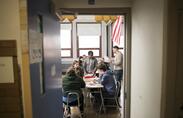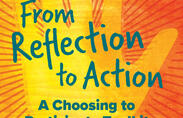Back to School: Building Community for Connection and Learning
These back-to-school activities and teacher resources will help you lay a foundation for a reflective and caring community at the start of the school year.

Fostering Civil Discourse: Difficult Classroom Conversations in a Diverse Democracy
The tools and strategies in this guide will help you prepare students to engage in difficult conversations on topics that matter to them, to their communities, and to our world.

In Pursuit of Democracy and Freedom: A US History Inquiry
This 5–7 day C3-aligned inquiry explores the compelling question, “How can we make real the ideals of democracy and freedom?”

We the People: Expanding the Teaching of the US Founding
This 5-7 day C3-aligned inquiry explores the compelling question "How do we reckon with a history full of complexities and contradictions?"

Choices in Little Rock
Get resources for teaching a unit on the efforts to desegregate Central High School in Little Rock, explored through the lens of civic choices.

Democracy and Current Events
This toolkit provides lessons and strategies for helping your students make sense of issues in the news related to democracy.

Teaching Resources for the US Elections
Use these resources on voting, media literacy, polarization, and bias to talk about US elections with your high school and middle school students.

Political Polarization Activities
Political Polarization in the United States
This Explainer defines the term political polarization and provides information on how it impacts US politics and society.

What Makes Democracy Work?
Explore this collection of lesson plans that cover a wide range of themes related to democracy, including citizen power and civic participation, the rule of law, the role of a free press, and more.

Free and Fair Elections: Why Do They Matter?
This mini-lesson uses our Free and Fair Elections explainer to help students reflect on the importance of elections, define the phrase “free and fair elections,” and learn about electoral systems in their region.

Free and Fair Elections
This Explainer describes the standards that governments need to meet before, during, and after an election to ensure that the election is "free and fair."

Democracy and Freedom: US History Capstone Project
This capstone project invites students to reflect on their own role in a democracy in light of what they’ve learned about freedom and democracy in US history.

From Reflection to Action: A Choosing to Participate Toolkit
This guide contains a flexible collection of activities, readings, lessons, and strategies designed to help you develop a meaningful civic education experience in your classroom.

10 Questions for Young Changemakers
This unit uses the 10 Questions Framework to explore two examples of youth activism: the 1963 Chicago schools boycott and the present-day movement against gun violence launched by Parkland students.


